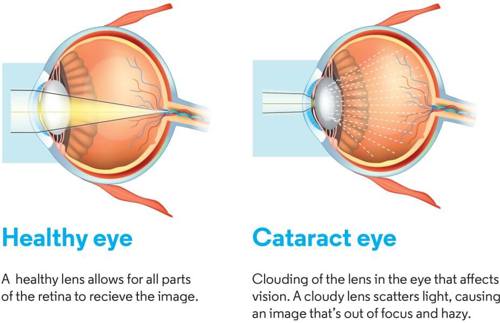Cataract Surgery is one of the most-performed voluntary surgical procedures in the world today, producing life-changing results for millions of patients every year.
Age is the most common risk for developing cataracts. However, lifestyle factors such as smoking can also increase the risk, often causing the cataracts to develop earlier and quicker. Excessive exposure to sunlight and ultra-violet light can also increase the speed at which cataracts develop. Diabetics may also be at great risk of developing cataracts.
Other common causes include a variety of drugs, including steroids. Although uncommon, people can even be born with cataracts.
What is a cataract?
A cataract is formed when the lens within your eye becomes cloudy. This can happen to all of the lens or just part of it. Although there are different types of cataract, the most common is age-related.

Signs and symptoms of cataracts
Cataracts can cause your vision to become clouded and less clear. You may also notice that you have a reduced quality of vision, increased light sensitivity to oncoming vehicle headlights, or that objects appear less colourful. You may also find that you need to change the prescription of your glasses more frequently than usual.
Cataracts are not painful and have no other symptoms. If you do experience red or irritated eyes at any time, you should not hesitate to seek guidance from your optometrist.
Treatment of cataracts
When new glasses are no longer effective, as is the case for many patients with cataracts, the only effective treatment is surgery. During cataract surgery, which typically takes around 15 minutes, the affected natural lens within the eye is removed and replaced by a synthetic one.
Surgery will be recommended once the cataract is causing symptoms or associated problems with everyday activities, such as watching television, driving and reading. Cataract surgery improves the vision of nearly all patients and has one of the highest success rates of all surgical procedures. Following surgery, your Optical Express Aftercare will ensure you have all the information and assistance you need to adapt to your new vision. This may include a change of glasses prescription, but whatever applies, we will be with you every step of the way.
What types of lenses are they?
Surgeons at Optical Express have access to a number of different premium intraocular lenses. Your treating surgeon makes the final decision on the appropriate lens for you based on your clinical needs and lifestyle demands.
Monofocal lenses
These lenses are mainly designed to reduce dependence on glasses for distance vision including driving. Most patients will still require glasses for visual tasks within arm's length, such as reading a mobile phone or tablet, using a computer, applying make-up or reading a restaurant menu.
Multifocal lenses
These remarkable lenses are designed to allow good vision at all distances - near, intermediate and far. Most patients do not require any glasses after surgery, while the few that do, typically only require them for a minority of daily tasks. Lenses in this classification may be referred to as multifocal, trifocal or extended depth of focus correct vision at multiple different distances.
1. Action on Cataracts. Reported by NHS Executive.
2. Longitudinal associations between visual impairment and cognitive functioning: The Salisbury Eye Evaluation Study. D Zheng et al 2018.
3. Based on a study of 6,138 Optical Express procedures performed, October 2019.
4. NHS Comparison with Optical Express clinical outcomes S.Scahllhorn Optical Online 2016.
5. RCO NOD Audit 2017 - 2018 versus Optical Express audit 2017 - 2018.